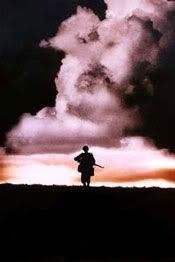Pacifist Politics
 If not the greatest evil, yet war is a great evil. Therefore, we should all like to remove it if we can. But every war leads to another war. The removal of war must therefore be attempted. We must increase by propaganda the number of Pacifists in each nation until it becomes great enough to deter that nation from going to war. This seems to me wild work. Only liberal societies tolerate Pacifists. In the liberal society, the number of Pacifists will either be large enough to cripple the state as a belligerent, or not. If not, you have done nothing. If it is large enough, then you have handed over the state which does tolerate Pacifists to its totalitarian neighbour who does not. Pacifism of this kind is taking the straight road to a world in which there will be no Pacifists.
If not the greatest evil, yet war is a great evil. Therefore, we should all like to remove it if we can. But every war leads to another war. The removal of war must therefore be attempted. We must increase by propaganda the number of Pacifists in each nation until it becomes great enough to deter that nation from going to war. This seems to me wild work. Only liberal societies tolerate Pacifists. In the liberal society, the number of Pacifists will either be large enough to cripple the state as a belligerent, or not. If not, you have done nothing. If it is large enough, then you have handed over the state which does tolerate Pacifists to its totalitarian neighbour who does not. Pacifism of this kind is taking the straight road to a world in which there will be no Pacifists.~C.S. Lewis, "Why I Am Not a Pacifist", The Weight of Glory (1949)
__________________________________
On this day:
1918 The Armistice is signed, marking the end of World War I.
Interesting Essay: Finding the Permanent in the Political: C. S. Lewis as a Political Thinker




4 Comment(s):
I'm glad you feel that way, Sandi, because I feel rather the opposite! I worry that they will just keep coming up with better and more efficient ways of killing people.
In this quote, he seems to imply that there is no middle ground between a totalitarian state and a liberal society that tolerates Pacifists. It seems like America, at least, falls somewhere in between. One can be a conscientious objector to a point, at least in America, but you won't be discharged from the military for it if you are objecting to war based solely on your political beliefs.
As much as I wish for it, I think we have a long way to go before we can "remove war." I think about the anti-war protests in NYC and how the numbers of protesters were underestimated by the NYC Police...who are overseen by the Mayor...a Republican. Invisible pacifists, perhaps, were marching...even if we had more of them...would they listen? *sigh*
Glancing through C.S. Lewis At the Breakfast Table, I found a paragraph that I thought would fit in today. It is from an essay written by Roger Lancelyn Green:
"The outbreak of war depressed Lewis deeply. He remembered the slaughter of World War I, which he had been close to. The university was expected to close, and Lewis spent many days of hard work moving books from his rooms in college to the basement and then, plans being changed, returning them again. He remarked that it was a blow, having spent so many years in preparing himself to write, that he should now find himself prevented from doing so. Events proved he was mistaken, but at the time he expected all academic work to become impossible. One evening after the fall of France, all were expecting an invasion. The Inklings were remembering passages in their work likely to prove obnoxious to the Nazis...it was not our happiest evening."
Perhaps an opportune time to hear a passage from a talk which CS Lewis gave in Oxford during WW2.
“The war creates no absolutely new situation: it simply aggravates the permanent human situation so that we can no longer ignore it. Human life has always been lived on the edge of a precipice. Human culture has always had to exist under the shadow of something infinitely more important than itself. If men had postponed the search for knowledge and beauty until they were secure, the search would have never begun... we are mistaken when we compare war to 'normal life.' Life has never been normal. Even those periods we think most tranquil, like the nineteenth century, turn out on closer inspection, to be full of crises, alarms, difficulties, emergencies.
Learning in War-Time – CS Lewis
Post a Comment
<< Home